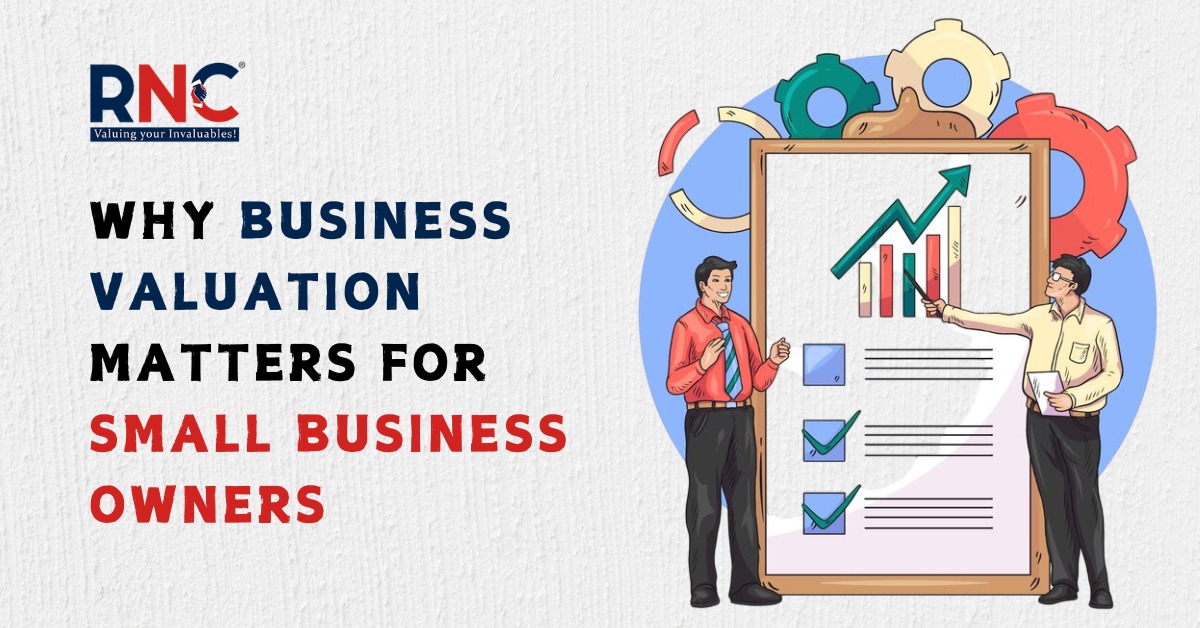
In 2025, business valuation has become an essential part of every small business’s growth strategy.
Whether you’re raising funds, planning a merger, transferring ownership, or simply assessing your company’s health, an accurate valuation helps you make data-driven decisions and stay compliant with financial regulations.
At RNC Valuecon LLP , we help small business owners understand their company’s true market worth, ensuring their valuations meet all IBBI, RBI, SEBI, and Companies Act standards.
For small businesses, valuation is more than just a financial number—it highlights strengths, identifies risks, and creates opportunities for expansion. Whether you are seeking investor funding, planning for succession, or selling your company, a business valuation ensures that you understand the true worth of your enterprise. A professional business valuation also fosters trust among stakeholders, including banks, investors, and buyers, ensuring transparency in financial decisions.
What is Business Valuation and Why Does It Matter for Small Businesses?
1. Attracting Investors and Raising Capital
Investors want to see measurable value before funding a business.
A professional valuation builds credibility and helps justify your company’s pricing during negotiations. It also ensures compliance with RBI and FEMA guidelines when foreign investments are involved.
2. Strategic Growth and Expansion
Valuation highlights your company’s strengths and areas that need improvement.
It helps owners identify key profit drivers, assess operational efficiency, and make informed choices about expansion, mergers, or diversification.
3. Succession or Ownership Planning
Many small businesses are family-run. Valuation assists during succession transfers, buy-outs, or adding new partners. It ensures fair value distribution and avoids future disputes.
4. Loan & Credit Approvals
Banks and NBFCs often require a valuation report when small businesses apply for secured loans or credit facilities.
An updated valuation reassures lenders about your repayment ability and the quality of your assets.
5. Tax, Audit, and Compliance
Valuation supports fair reporting under the Companies Act, aligns with audit standards, and ensures transparent disclosures.
It is also critical during ESOP issuances or when converting into a private limited company.
How Valuation Impacts Financial Stability, Exit Planning, and Investment Opportunities
A well-executed business valuation enhances financial stability by offering a clear understanding of company assets, liabilities, and cash flow. This is particularly important for securing bank loans, attracting investors, and planning for long-term sustainability. Lenders and financial institutions often require valuation reports to assess a business’s repayment capacity and grant favorable loan terms.
Beyond financial stability, business valuation plays a critical role in exit planning and investment opportunities. If you plan to sell your business or bring in investors, having a professional valuation builds credibility and trust. Buyers and investors want assurance that they are making a sound financial decision, and a structured valuation helps you negotiate the best possible terms. If you want to understand the valuation process in detail,
refer to How Does the Business Valuation Process Work.
Common Myths About Company Valuation for Startups and Small Enterprises
1. Business valuation is only necessary when selling a company
Many small business owners believe that valuation is only relevant during mergers or acquisitions. However, regular valuation helps in strategic planning, securing investments, and ensuring financial stability. It provides a clear picture of a company’s strengths and weaknesses, helping owners make informed business decisions at any stage.
2. Revenue equals business value
While revenue is a key factor, business valuation considers multiple aspects such as assets, profitability, market position, and growth potential. A company with high revenue but poor cash flow management or weak market positioning may have a lower valuation than expected. Comprehensive valuation methods ensure a more accurate reflection of business worth.
3. Startups don’t need valuation until they are profitable
Many entrepreneurs assume that valuation is irrelevant in the early stages, but investors assess startups based on potential, not just profits. Factors like intellectual property, market size, and scalability play a critical role in valuation. A well-structured valuation helps startups attract funding and negotiate fair equity distribution.
Key Business Valuation Methods Every Small Business Owner Should Know
Determining the value of a business requires a structured approach, using financial models that assess its assets, market position, and earning potential. Small business owners must understand different valuation methods to ensure they get an accurate estimate of their company’s worth. The right valuation technique depends on factors like industry type, business model, and financial health. Below are the three most widely used valuation methods:
1. Asset-Based Valuation – Understanding Business Worth
This method calculates a business’s net worth by considering tangible and intangible assets. It is ideal for businesses with substantial physical assets, such as manufacturing firms. The book value method and liquidation value method are commonly used approaches within asset-based valuation.
2. Market-Based Valuation – Comparing with Industry Benchmarks
This approach evaluates business worth by comparing it with similar companies in the industry. It considers factors such as competitor performance, recent sales data, and revenue multiples. To explore the role of revenue in business valuation,
check out How Revenue Is Important in Business Valuation.
3. Income-Based Valuation – Forecasting Future Growth
Income-based valuation predicts future cash flow and discounts it to present value. The Discounted Cash Flow (DCF) method and capitalization of earnings approach are commonly used for businesses focused on growth and profitability forecasting.
Each valuation method has unique advantages, and selecting the right one depends on business goals, market position, and industry trends.
Learn more about What Factors Are To Be Considered While Doing Business Valuation.
When Should Small Business Owners Get a Business Valuation?
A business valuation is not just useful when selling a company—it plays a crucial role in strategic decision-making, financial planning, and securing opportunities. Small business owners should conduct valuations periodically to stay informed about their company’s financial standing. Here are the key situations when a valuation becomes essential:
1. Before Selling Your Business – Ensure the Right Price
A valuation ensures the business is priced correctly, preventing losses from undervaluation or difficulties in selling due to overpricing. It builds buyer confidence and streamlines negotiations, helping owners secure the best possible deal.
2. For Investor Funding – Attracting Capital
Investors assess a company’s value before committing funds, and a structured valuation report strengthens credibility. It highlights financial stability, market position, and growth potential, increasing the chances of securing investments.
3. During a Merger or Acquisition – Strengthening Negotiation Power
Understanding business worth is essential for negotiating fair deals and assessing assets, liabilities, and goodwill. A valuation ensures transparency, preventing financial disputes and facilitating a smooth transition between companies.
4. For Securing Bank Loans – Proving Business Worth
Lenders require financial proof before approving loans, and a valuation demonstrates stability and repayment ability. It improves access to funding, enhances borrowing terms, and increases the likelihood of securing favorable loan conditions.
5. For Succession & Estate Planning – Smooth Business Transition
A valuation helps distribute ownership fairly among successors and prevents legal disputes. It also ensures compliance with tax regulations and aids in a structured transition plan for long-term business sustainability.
6. During Financial Uncertainty – Managing Business Risks
In times of market downturns or internal struggles, a valuation helps businesses reassess cash flow and profitability. It provides insights for restructuring, cost management, and strategic decision-making to maintain stability.
To learn more about turnover-based valuation challenges,
check Challenges in Turnover-Based Company Valuation and How to Overcome Them.
Common Business Valuation Mistakes Small Business Owners Make
-
- Overestimating or Underestimating Business Value
Many owners rely on assumptions rather than financial analysis, leading to unrealistic expectations. An inaccurate valuation can result in pricing mistakes during sales, funding, or negotiations. - Ignoring Intangible Assets
Brand reputation, customer relationships, and intellectual property significantly impact a business’s worth. Neglecting these factors can lead to an undervaluation and missed financial opportunities. - Not Updating Valuation Regularly
Business value fluctuates with market trends, industry shifts, and company growth. Without periodic valuations, owners may lack accurate data when making strategic decisions. - Using a One-Size-Fits-All Approach
Each business requires a valuation method tailored to its industry and financial model. Relying on a single approach, such as revenue-based valuation, may not reflect the true worth of the company. - Failing to Prepare Proper Financial Documentation
Incomplete or unorganized financial records can result in inaccurate assessments. Detailed profit and loss statements, tax returns, and asset reports are essential for a reliable valuation. - Overlooking Market Conditions
Business valuation is influenced by competitor performance, industry demand, and economic factors. Ignoring external conditions can lead to an inaccurate valuation and poor decision-making. - Not Seeking Professional Expertise
DIY valuations or reliance on informal estimates can result in costly errors. Engaging a professional ensures that all financial, market, and operational factors are considered for an accurate valuation.
- Overestimating or Underestimating Business Value
How to Choose the Right Business Valuation Firm for Your Small Business
Choosing the right valuation firm ensures an accurate and fair assessment of your company. Look for firms with industry expertise and a strong track record to gain relevant insights. Transparency in valuation methodology is also crucial—working with professionals who provide detailed reports and personalized consultations ensures better decision-making. RNC specializes in providing accurate business valuation services tailored for small businesses.

Conclusion:
For small business owners, understanding what your company is truly worth is the first step toward sustainable growth.
An independent business valuation enables smarter financing, better investor relationships, and stronger financial control.
At RNC Valuecon LLP, we help entrepreneurs unlock business potential with accurate, regulator-compliant valuation reports trusted by banks, NBFCs, and investors across India.
Need a business valuation for funding or compliance?
consultation with our valuation experts
FAQs
1. Why do small business owners need valuation?
It helps assess true market worth, attract investors, and plan for long-term growth or exit strategies.
2. How often should a small business be valued?
At least once a year, or before major events like fundraising, partnerships, or ownership changes.
3. Which valuation method suits small businesses best?
The income-based or market-based approach is often most effective for SMEs with stable revenue streams.
4. Who can perform small business valuations in India?
Certified IBBI-registered valuers or professional firms like RNC Valuecon LLP with expertise in SME valuations.

About the author:
Sahil Narula
Sahil Narula is the Managing Partner at RNC Valuecon LLP and a Registered Valuer with IBBI. He brings over a decade of experience in Valuation Services, Corporate Finance, and Advisory, having led numerous complex assignments under the Insolvency & Bankruptcy Code, 2016, Mergers & Acquisitions, Insurance, and Financial Reporting.
He is a regular speaker at national forums (ASSOCHAM, CII, ICAI, IBBI, Legal Era) and currently serves as Co-Chairman of ASSOCHAM’s National Council on Insolvency & Valuations and a member of CII’s Task Force on Insolvency & Bankruptcy.
🤝Connect with Sahil on LinkedIn.
